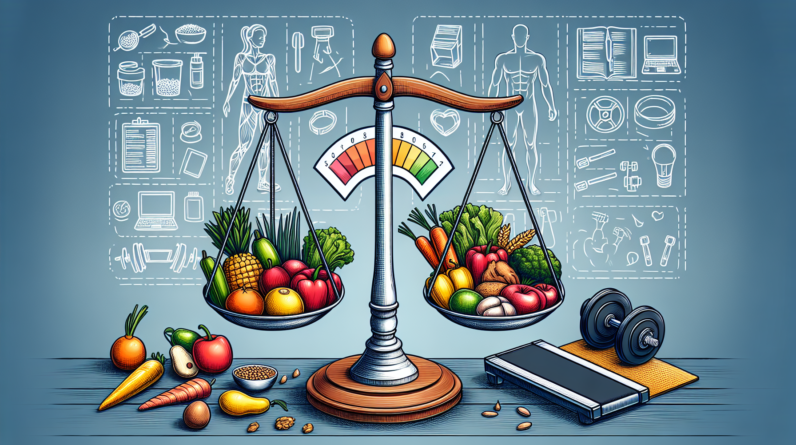
In our pursuit of attaining our ideal weight, we often find ourselves overwhelmed by the plethora of diet options available in today’s market. In this article, we aim to provide you with valuable insights and practical tips on how to achieve your desired weight through diet. By exploring the relationship between diet and weight management, we will delve into the key principles and strategies that can guide you towards making sustainable and informed choices for a healthier lifestyle. With a focus on health and fitness, this website serves as a reliable source of information to help you navigate the complex world of dieting.
Achieving Your Ideal Weight through Diet
Maintaining a healthy weight is crucial for overall well-being and reducing the risk of chronic diseases. However, achieving and maintaining an ideal weight can sometimes feel like an uphill battle. Thankfully, with the right knowledge and strategies, it is possible to achieve your weight goals through diet alone. In this article, we will explore the importance of setting realistic weight goals, understanding the basics of weight loss, determining your daily caloric needs, creating a balanced and nutritious meal plan, practicing portion control, and incorporating a variety of fruits and vegetables, lean proteins, and healthy fats into your diet. We will also discuss the significance of staying hydrated and avoiding sugary beverages to support your weight loss journey.
Choose a realistic and attainable weight goal
The first step in achieving your ideal weight is to set a realistic and attainable goal. It is important to approach weight loss with a long-term perspective rather than seeking quick fixes or crash diets. Instead of focusing on achieving a specific number on the scale, consider goals such as improving overall health, increasing energy levels, or fitting into a certain clothing size. Setting realistic and attainable goals ensures that you maintain a healthy mindset throughout your weight loss journey and enhances the likelihood of long-term success.
Understand the basics of weight loss
Before embarking on a weight loss journey, it is essential to understand the basics of weight loss. In its simplest form, weight loss occurs when you consume fewer calories than you burn. This creates a calorie deficit, prompting your body to utilize stored fat for energy. However, it is important to strike a balance by ensuring that you still provide your body with adequate nutrients to support overall health and well-being.

Determine your daily caloric needs
To effectively lose weight, it is crucial to determine your daily caloric needs. This can be done by calculating your basal metabolic rate (BMR), which is the number of calories your body requires at rest. There are various online calculators available that can provide you with an estimate of your BMR based on factors such as age, gender, height, and weight. Once you have your BMR, you can then adjust it based on your activity level to determine your total daily caloric needs.
Create a balanced and nutritious meal plan
To achieve and maintain your ideal weight, it is important to create a balanced and nutritious meal plan. Your meal plan should include a variety of foods from all essential food groups, such as fruits, vegetables, lean proteins, whole grains, and healthy fats. Aim to incorporate nutrient-dense foods into your meals that provide essential vitamins, minerals, and antioxidants. Avoid highly processed and sugary foods, as they offer little nutritional value and can hinder your weight loss progress.

Focus on portion control
Portion control plays a significant role in weight management. It is important to be mindful of portion sizes and avoid overeating. A simple way to practice portion control is to use smaller plates and bowls, which can help create the illusion of a fuller plate. Additionally, measuring your food and using portion control tools such as food scales and measuring cups can assist in accurately determining serving sizes. Remember, it takes time for your body to signal fullness, so eating slowly and paying attention to your body’s hunger and fullness cues is crucial.
Include a variety of fruits and vegetables
Fruits and vegetables are an essential component of any healthy diet, and they play a vital role in weight management. They are low in calories and high in fiber, which helps to promote satiety and regulate blood sugar levels. Aim to include a wide variety of colorful fruits and vegetables in your meal plan, as different fruits and vegetables offer a range of nutrients and antioxidants. Incorporate them into your meals and snacks throughout the day to ensure you are getting a healthy dose of vitamins, minerals, and fiber.
Incorporate lean proteins into your diet
Including lean proteins in your diet is essential for weight loss and overall health. Protein is known to increase feelings of fullness, boost metabolic rate, and preserve lean muscle mass during weight loss. Incorporate lean sources of protein such as chicken, turkey, fish, tofu, eggs, and legumes into your meals. Aim to include protein in each meal and snack to ensure you are meeting your daily protein needs.
Choose healthy fats
Contrary to popular belief, fats are an essential part of a healthy diet and can support weight loss. Healthy fats, such as those found in avocados, nuts, seeds, and olive oil, are beneficial for hormone production and nutrient absorption. They also help to promote feelings of satiety and can help prevent overeating. While it is important to incorporate fats into your diet, be mindful of portion sizes, as fats are calorie-dense. Aim to include a small amount of healthy fats in each meal to reap their benefits.
Stay hydrated
Staying hydrated is crucial for overall health and achieving your weight goals. Drinking an adequate amount of water throughout the day can help boost metabolism, promote feelings of fullness, and prevent overeating. It is recommended to drink at least eight glasses of water per day, and even more if you are physically active. Be mindful of sugary beverages such as soda and fruit juices, as they can add unnecessary calories and hinder your weight loss progress.
Avoid sugary beverages
To support your weight loss journey, it is important to avoid sugary beverages. Beverages such as soda, energy drinks, and sweetened fruit juices are high in calories and sugar, yet offer little to no nutritional value. These empty calories can quickly add up and sabotage your weight loss efforts. Instead, opt for healthier alternatives such as water, unsweetened tea, and infused water with fruits or herbs to stay hydrated without adding excess calories.
By following these strategies and implementing them into your lifestyle, you are well on your way to achieving and maintaining your ideal weight. Remember, it is essential to approach weight loss as a long-term commitment to your health and well-being. By adopting a sustainable approach to eating, allowing yourself occasional indulgences, monitoring your progress, and seeking support when needed, you can successfully manage your weight and lead a healthier, happier life.






